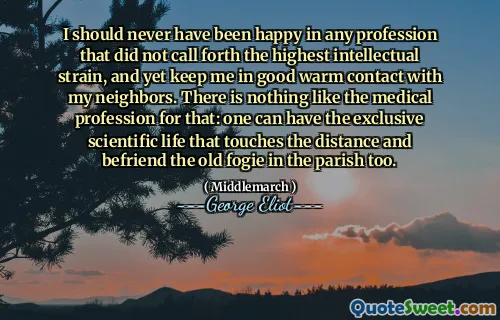still-it could not be fairly called wooing a woman to tell her that he would never woo her. It must be admitted to be a ghostly kind of wooing.
In "Middlemarch," George Eliot explores complex themes of love and communication. The quote reflects the irony of seeking a romantic connection yet declaring one’s commitment to remain distant. It suggests that a proposal lacking genuine intention can feel spectral, as if the act of confessing one’s limitations somehow replaces true courtship. Through this lens, Eliot critiques the nature of relationships, highlighting the paradox of expressing interest while simultaneously denying any possibility of intimacy. This ghostly form of wooing raises questions about the authenticity of emotional engagements, emphasizing that true connections require more than mere acknowledgment of feelings.
In "Middlemarch," George Eliot explores complex themes of love and communication. The quote reflects the irony of seeking a romantic connection yet declaring one’s commitment to remain distant. It suggests that a proposal lacking genuine intention can feel spectral, as if the act of confessing one’s limitations somehow replaces true courtship.
Through this lens, Eliot critiques the nature of relationships, highlighting the paradox of expressing interest while simultaneously denying any possibility of intimacy. This ghostly form of wooing raises questions about the authenticity of emotional engagements, emphasizing that true connections require more than mere acknowledgment of feelings.






